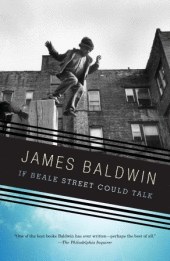If Beale Street Could Talk
内容简介
In this honest and stunning novel, James Baldwin has given America a moving story of love in the face of injustice. Told through the eyes of Tish, a nineteen-year-old girl, in love with Fonny, a young sculptor who is the father of her child, Baldwin’s story mixes the sweet and the sad. Tish and Fonny have pledged to get married, but Fonny is falsely accused of a terrible crime and imprisoned. Their families set out to clear his name, and as they face an uncertain future, the young lovers experience a kaleidoscope of emotions–affection, despair, and hope. In a love story that evokes the blues, where passion and sadness are inevitably intertwined, Baldwin has created two characters so alive and profoundly realized that they are unforgettably ingrained in the American psyche.
......(更多)
作者简介
James Arthur Baldwin was an American novelist, essayist, playwright, poet, and social critic.
James Baldwin offered a vital literary voice during the era of civil rights activism in the 1950s and '60s. He was the eldest of nine children; his stepfather was a minister. At age 14, Baldwin became a preacher at the small Fireside Pentecostal Church in Harlem. In the early 1940s, he transferred his faith from religion to literature. Critics, however, note the impassioned cadences of Black churches are still evident in his writing. Go Tell It on the Mountain, his first novel, is a partially autobiographical account of his youth. His essay collections Notes of a Native Son, Nobody Knows My Name, and The Fire Next Time were influential in informing a large white audience.
From 1948, Baldwin made his home primarily in the south of France, but often returned to the USA to lecture or teach. In 1957, he began spending half of each year in New York City. His novels include Giovanni's Room, about a white American expatriate who must come to terms with his homosexuality, and Another Country, about racial and gay sexual tensions among New York intellectuals. His inclusion of gay themes resulted in a lot of savage criticism from the Black community. Eldridge Cleaver, of the Black Panthers, stated the Baldwin's writing displayed an "agonizing, total hatred of blacks." Baldwin's play, Blues for Mister Charlie, was produced in 1964. Going to Meet the Man and Tell Me How Long the Train's Been Gone provided powerful descriptions of American racism. As an openly gay man, he became increasingly outspoken in condemning discrimination against lesbian and gay people.
On November 30, 1987 Baldwin died from stomach cancer in Saint-Paul-de-Vence, France. He was buried at the Ferncliff Cemetery in Hartsdale, near New York City.
......(更多)
目录
......(更多)
读书文摘
我累了,我开始想,说不定所有发生的事情都有道理。是这样的:如果没有道理,这样的事情怎么会发生?不过这个想法实在是很可怕。有了这样的想法,肯定是因为遇到麻烦了—而且是遇到了没有道理的麻烦。
......(更多)






